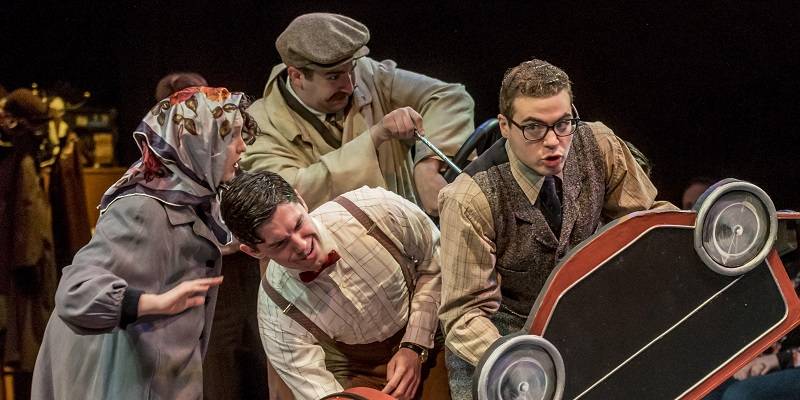There is something to be said for a show that captivates its audience with its tight and impressive choreography. There is also something to be said for a show that makes people laugh heartily and/or well up with tears. There is still something else to be said for a show that tells a satisfying story in a compelling and creative way.
What does one say about a play, about a cast, about a production that does all that? I’m not overstating the case when I say that, as I sit at my laptop about an hour after the end of Illinois Theatre’s opening night performance of Failure: A Love Story, I’m somewhat at a loss for words that are complimentary enough.
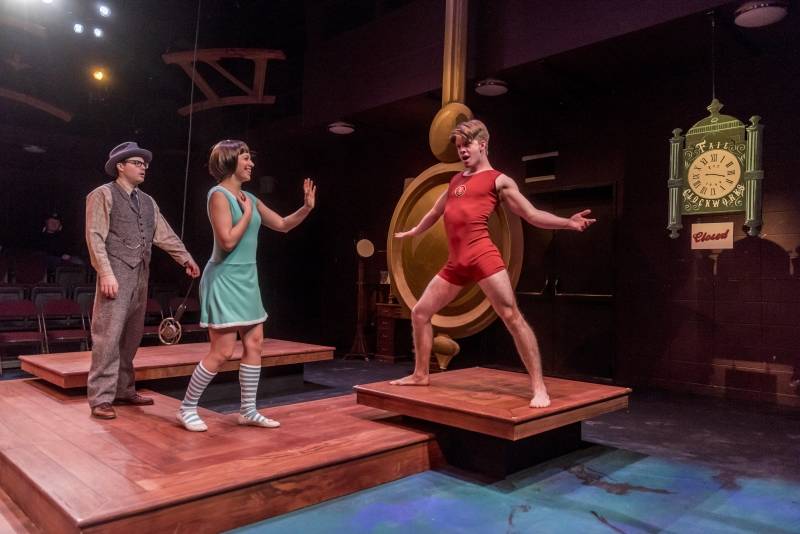
To begin with, as all shows must, let’s start with the script. The play, by Philip Dawkins, is as upbeat and sunny as a play so steeped in death could hope to be. It is utterly charming from its first moment to its last, and contains within it such varied inhabitants as famous swimmers, exotic animals, a star-crossed lover, and a family as delightful as they are doomed. The Fail family — over the course of eighty years (and about ninety minutes)— meet one-by-one with enough unexpected ends to fill an Edward Gorey book, and yet it is the life force and not the death knell of each that stays with you.
Each of the Fail sisters is unique and exquisitely embodied by a trio of brilliant actors: Gertrude (Ellen Magee), the eldest, is the straight-arrow manager of the family business; Jenny June (Jessica Kadish), the “middlest,” is a tough-talking competitive lake swimmer; and Nelly (Katelynn Shennett), the youngest, is a jazz-loving free spirit. The three of them live above the clock repair shop opened in 1900 by their deceased parents (Aryamehr Mohseni and Lauren Farbota, who, like most of the cast, play a multitude of distinctive supporting roles). The last of the Fails, young John N. (Bryce Lunsky), isn’t great with people, but his facility with animals is somewhat miraculous.
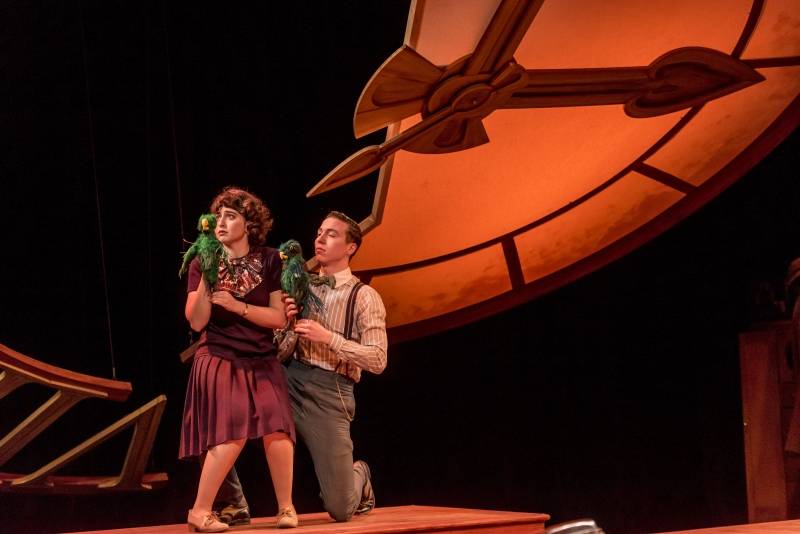
The play begins with a history of the Fail family, which is voiced and enacted in dizzying detail and at breakneck speed by the entire cast and is a brilliant bit of choral storytelling. This whirligig opening leads up to the pivotal arrival of Mortimer Mortimer (Mark Tyler Miller), a charismatic movie-idol type who will find himself under the spell of “the Fail Girls.” As the “heart” of the story kicks in, the ensemble of actors bob and weave between dozens of characters, making clocks, dogs, tugboats, spectators, and (most charmingly) a gramophone spring to joyous life.
I won’t spoil the story for you, but I’ll tell you that it’s absolutely worth seeing and hearing. And, as it is told, you’ll meet actors Harry Belden, Esther Fishbein, Sara Freedland, Christopher Khoshaba, Nick Lannan, Yvon Streacker, and Patrick Weber, each of whom moves through the narrative with the precision and timing of a well-wound clock. It’s typical in a review like this to single out one actor or another as being especially talented or having particularly sharp comic skills. The problem with this show (if you can call it a problem) is that every member of the cast is that actor. That’s how good this ensemble is—crackling with energy and sharp as tacks.
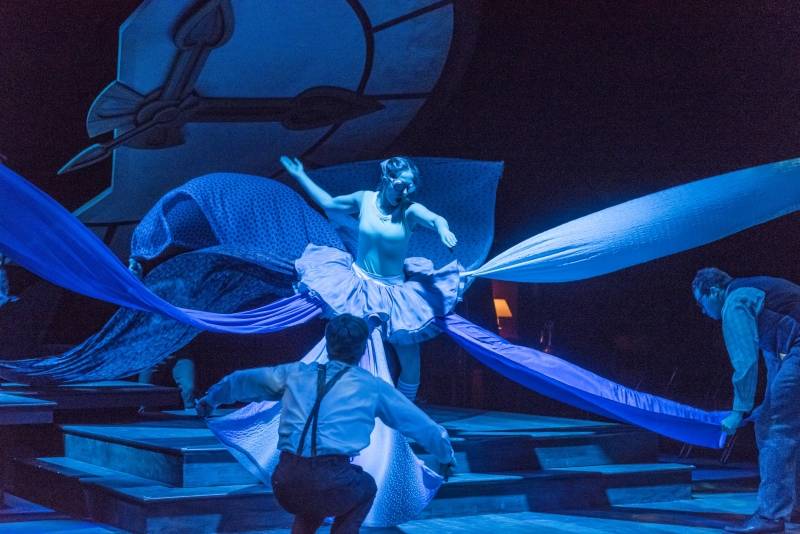
The lighting (by Michelle E. Benda), sound (Tyler Knowles), music (Justin Brauer), and set (Evan Park and Roy H. Howington) are seamlessly rendered, as are the costumes by Nicole Zausmer. All of these flow together, creating a world that is so much more than painted flats or sound cues. This is a world so smartly put together—1920s timely and yet fairytale timeless—that it’s hard to imagine a better means of staging this particular play.
I have not yet mentioned the director of this dream sequence, and it’s high time I did. Because no matter how good the script is (and it really is), no matter how good the cast is (and it really really is), none of it would matter too much without a steady hand at the wheel. JW Morrissette, who oversees the BFA Theatre Studies Program as well as a raft of acting and directing courses, is as good as it gets. There is a potent mixture of brisk efficiency and infectious fun to the entire affair, none of which happens without a director’s vision and creativity, and the results are tremendously effective.
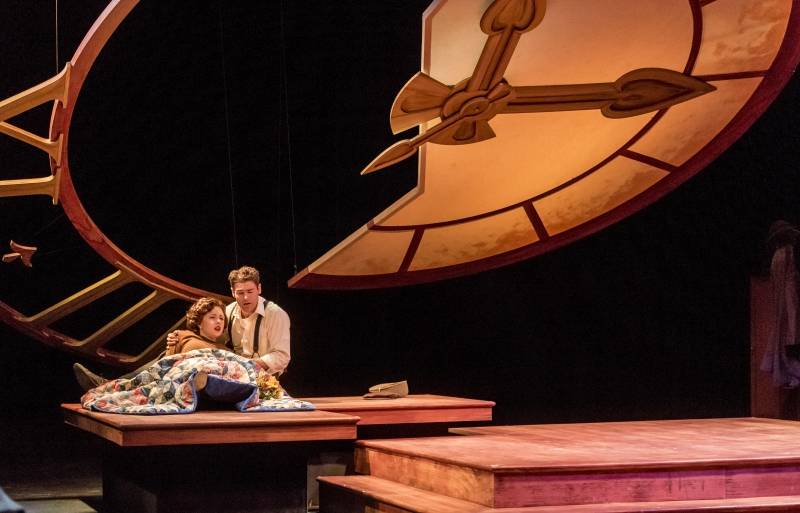
There might be nothing so important in the theatre as good storytelling. And whether the story is told with singing and dancing (this show has both) or with puppets (also on hand, so to speak), a good story is a gift. I heard belly laughs and tearful sniffles in equal measure, and I saw people smiling and leaning forward in their seats all around me. I heard a student behind me say, “This is my first play,” before the lights went down, and I heard another say, “Wow, that got deep,” as the audience filed out at play’s end. And somewhere in between, we all saw something magical. We all had a lovely shared experience.
In other words, we were all given a gift.
Performances of Failure: A Love Story continue through February 12th at Krannert Center for the Performing Arts. My official recommendation is that you click here to make a reservation. Do it. Do it right now.
Photos courtesy of Darrell Hoemann.








